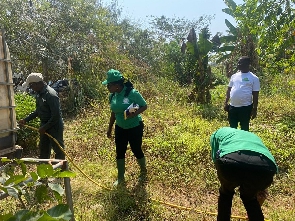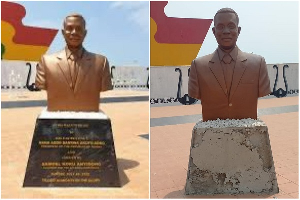The Ministry of Food and Agriculture (MoFA) in collaboration with the Peasant Farmers Association of Ghana (PFAG) is enhancing the capacities of selected lead farmers, public and private agricultural extension agents on agroecology principles and concepts to enhance service delivery.
The training workshop will help beneficiaries who were drawn from all regions across Ghana work closely with farmers to educate and guide to boost agricultural activities.
Agroecology is a system where traditional knowledge, farmers’ practices and the science of ecological principles are applied to the food systems. It includes socio-cultural and economics and practices such as organic farming and regenerative agriculture to contribute to sustainable development.
It forms part of the MoFA’s ECOWAS Agroecology Programme in Ghana and PFAG’s drive to promote agroecology which aims at transforming sub-Regional agriculture in the face of a rapid growing population, natural resources degradation, biodiversity loss, food insecurity, climate change and addressing nutritional security.
The Programme is being fundedFrench Development Agency (AFD) and European Union (EU)
Mr. Kingsley Kwasi Agyemang, MoFA, National Correspondent, ECOWAS Agro-Ecology Programme in Ghana, speaking to the Ghana News Agency on the sidelines of a three-day training at Amanchia in the Atwima Nwabiagya District of Ashanti Region said the Ministry was poised to provide the enabling environment for agroecology transitioning.
He believed that if farmers were to use natural resources to generate and process fertilizers, the case of the Russian-Ukraine War, hikes in prices of inputs will not affect production and productivity.
Touching on the progress of the Programme which began in 2022 in Ghana, he indicated that it had developed an action plan and charter for National Consultation Framework on Agroecology in Ghana (NCFA-GH), and that the plan outlines a five-year strategy for action.
Mr. Agyemang was hopeful that the training would better position agricultural extension agents and lead farmers to generate relevant information and data on agroecology practices.
Mr. Bismark Nortey, Programmes Officer, PFAG, said in opting for a more sustainable way of farming, agroecology had been identified as one of the ways to deal with the negative effects of climate change, increasing cost of agricultural inputs and ensuring food sovereignty production good and nutritious food.
He said this was why the Association was continuously building capacities of farmers to understand the principles of the farming practices, adopt and contribute to increased food productivity.
Dr. Kofi Boa, Director and Founder, Center for No Till Agriculture, exposed participants to both theoretical and practical hands-on training including principles guiding agroecology, on-farm water harvesting, integrating livestock farming, cultivation of varieties plantation crops (ensuring diversification).
He stressed the need for farmers to carry out such activities in agricultural production especially, water harvesting for use during the dry season.
Business News of Friday, 10 February 2023
Source: GNA

















